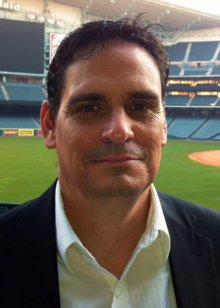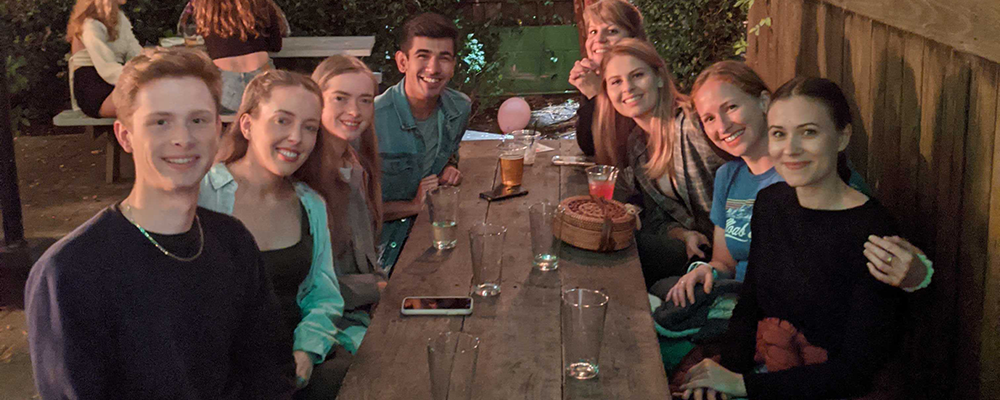“…capabilities and expertise in tools such as SQL, R, and Python. Pragmatic skills are important as well because we want not just dreamers but people who can get projects done by a deadline. Human and social skills are also important. You must work with people who are foreign to you, baseball players, coaches, and others on the team. You’re in a field that’s changing, so the more social maturity someone has, the better.”

At the time of the interview, Sig Mejdal was the Special Assistant to the General Manager for the Houston Astros. In his role, Sig supported the development, implementation, and monitoring of improvement initiatives throughout the organization. Since joining the Astros in 2012 as one of the organization’s key analysts, Sig has contributed to personnel decisions ranging from the draft to the Major League team.
Garrett: Can you tell us a little bit about your background? I know that you were an engineer and worked at NASA; how did that lead you to baseball?
Sig: I earned my Bachelor’s degree in Engineering and two Master’s degrees, one in Operations Research and the other in Cognitive Psychology, which was surprisingly useful regarding change management. How I got into baseball – ever since I was a kid, I was always fascinated with the numbers and would follow any research that was out there. As I got older, that interest didn’t go away. I never imagined that I would be anyone other than an outsider interested in baseball research. When the book Moneyball came out, I thought all teams would be climbing over one another to get their own analyst. I thought that all I needed to do was let them know that I was available and that would lead to a job by the end of the week. That was far from the truth, but it eventually ended up working out with the Cardinals.
Garrett: I remember you telling me that it took you sending in resumés for a year and a half until the Cardinals called. What do you think pushed them to change the way they were implementing their front office?
Sig: It was the owner Bill Dewitt, who grew up in baseball. His father worked very closely with Branch Rickey, who was one of the founding fathers of baseball innovation. Bill had a business background, and I think it was the combination of him looking at how the decisions were made in baseball and having read Moneyball. He realized that the processes could be improved. Even though the team was winning 100 games at the time, and one might think that “nothing’s broken,” he wanted to fix it. He brought in Jeff Luhnow, who was a McKinsey consultant and had worked with his son-in-law into the Cardinals organization. In 2005, Jeff brought me in as an analyst to help him make draft selections.
JD: What is your relationship like with Billy Beane from the movie Moneyball? Did you reach out to him when you first started in sabermetrics?
Sig: I have never formally met him, however, I would love to. I have seen him speak. It was Billy Beane, Sandy Alderson, and Paul DePodesta who were the founding fathers of sabermetrics in Oakland. This lead to Moneyball and an industry change. My appreciation for all of them is great.
JD: Who was your mentor when you first started?
Sig: No one, it did not exist. I was inspired by the fact that Paul (DePodesta) had an economics background working inside the front office in baseball. That inspired me. If he could do it, I felt I could as well. All I needed to do was find an owner or a team that was interested.
Garrett: This is your 14th season in the profession. During that time, you have been a part of three World Series championship teams. What role do you think you and the analytics team played in helping the team win those championships?
Sig: For the first World Series in 2006, absolutely nothing. I do not think me being around the office improved morale. But for the 2011 World Series, I was involved with the analytics of the amateur draft, and we had a lot of success there. We drafted quite a few players that brought home that title and I had a small part in that, so that is amazingly satisfying. With respect to the 2017 World Series, Jeff and I had come from St. Louis and Jeff recreated every department. My fingerprints were in different areas to some degree. Similar to St. Louis, some of our success came from the drafted players. To see Carlos Correa, Lane McCullers, and Alex Bregman do so well, especially in game 5, that was incredibly rewarding.
Garrett: To follow up, when you and Jeff went over to the Astros, you said he changed almost every department. To have that kind of buy-in must be really beneficial to your department. When you were with the Cardinals, how did you convince them that they should accept your methods of analytical decision-making? If they did not go with everything you said, how did you decide when to emphasize using the models you built to change strategies?
Sig: I have always had a very good relationship with Jeff from the beginning, so my job as an analyst was easier than many other analysts in the draft. Jeff was unconventional compared to other General Managers. As a former McKinsey consultant, he didn’t fit the mold of a traditional baseball GM. So him having been in a field that emphasized data-driven arguments and retrospective studies helped. We emphasized our methods in a gradual fashion, so the anecdotes that we lived and experienced helped. And so those things together gave Jeff the confidence to anchor his decisions to a large degree on the algorithms processes we created.
JD: You mentioned how you worked with the Tri-city Valleycats for a season, I was wondering what your experience was like going from the majors to becoming a development coach?
Sig: I really went from the front office to wearing a uniform in short-season A. That change was dramatic and significant. I don’t know if anyone has ever gone from the front office, put on a uniform, and is now riding buses, eating bad food, and sleeping in bad hotels. Personally, it was an amazing experience. It was something I never thought I would participate in. I had not put on a uniform since little league, why would I as a grown up? It’s an experience few people get. It was also incredibly educational, I learned a ton from the players and coaches. Getting to see them use our tools and brainstorm what we could do better was beneficial. It was good for the Astros and a learning experience for the front office. It was also good for me personally to experience something like that.
Garrett: Being an analyst, you do not fit the traditional profile as a coach. How did your players respond to the types of feedback that they got, and how do you think their response was different than it might have been from a more traditional coach?
Sig: I was anxious about how the players were going to treat me, that I was just the NASA guy from the front office coming onto the team in uniform. I had seen and heard some pushback that this is what’s wrong with baseball, that I was putting on a baseball uniform, which is sacred and people say an analyst shouldn’t do. So I was anxious about how the players would treat me. From the beginning, they were wonderful. They were brand new into the system and several levels away from the major leagues. When there’s this guy that’s working hard and helping them, they welcome that, whether it was a coach with 30 years of experience or me with 30 hours of experience.
Garrett: What is the right balance of the old school experts and analysts in a baseball organization?
Sig: Let’s touch upon an evaluation standpoint because that is where the original drama was with Moneyball and to some degree still today. Let’s say you have experienced scouts evaluating players and then you might have analysts at the office analyzing players. Every office has an analyst and every team says that they want the best of both worlds. Now, these are different methodologies, the scouting methodology and the performance-based methodology. You can’t both accept and reject the player. It gets interesting when they disagree in what you do. Working with Jeff with the Cardinals and now the Astros, we have always taken the view to see what history says is the best way of combining both methodologies. On the one hand, it’s a shame to be ignoring or not weighing the voice of the scout enough, but on the other hand, what a shame it would be to weigh it too much, so let’s do our best to see what balance that right amount is. I do not think it is a judgment call and that you could look at data to figure out the appropriate balance.
JD: Going forward what advice do you have for young professionals looking to enter sabermetrics?
Sig: First of all, get mad skills. The Institute for Advanced Analytics here is amazing. The master’s degree you get in 11 months and the pragmatic skills along with the technical skills are first-rate. The difference between a master’s and an undergraduate student is huge and if you’re 11 months away from getting those skills and that degree, I would recommend to any undergraduate to get those skills. And if you do not get into sports initially because of that, well you have the skills most in demand in this world so you will likely get a job of your choosing. You can continue to develop those skills or you could continue to try and get into sports. Sports are likely going to pay you less and work you harder, so you must be passionate about this. You are giving up revenue and taking up more time to work in sports, so this better just not be something you think is cool but something you like. Teams are aware of this and they do not want to hire someone that they will lose a year and a half later because they found a cooler job. The more you can show that you’re passionate about baseball, whether through research or becoming published in Fangraphs or a peer-reviewed journal, the better. If you have the combination of technical and pragmatic skills, along with the passion for sports, your chances are as good as anyone’s. There are not an infinite amount of jobs, but there are seemingly an infinite amount of people looking for them, so it’s difficult.
JD: What attributes do you look for when you look to bring an analyst on your team?
Sig: Capabilities and expertise in tools such as SQL, R, and Python. Pragmatic skills are important as well because we want not just dreamers but people who can get projects done by a deadline. Human and social skills are also important. You must work with people who are foreign to you, baseball players, coaches, and others on the team. You’re in a field that’s changing, so the more social maturity someone has, the better. A passion for this is necessary as well because the hours are long and you can make more money somewhere else.
Columnists: Garrett Pedersen, JD Kent
